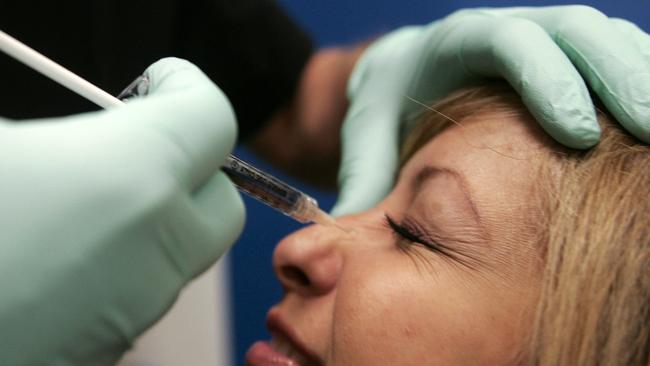The Dark Side of Beauty: Patients risking death, blindness and other major complications due to cosmetic industry ‘grey area’
COSMETIC injections are becoming more and more common. But behind the allure of smooth skin people are gambling with their lives.

WHEN Danielle* got her first anti-wrinkle treatment at a popular laser clinic chain, she was horrified when her injector had one brief Skype chat with a doctor before the procedure got under way.
The 30-year-old Melbourne woman was so concerned she ended up cancelling future treatments.
“It freaked me out how little they cared,” she said. “I ended up stopping because I just don’t trust them.
“I felt like it was a bit of a machine — they didn’t tell me about possible side effects or the effects of long-term treatment.”
Danielle’s decision to cancel future treatments could have saved her from blindness, painful complications or even death.
Because according to cosmetic experts, the widespread practice of Skype “consultations” is putting patients at serious risk.
This week news.com.au is running a series of stories exploring why anyone with a standard medical degree is legally allowed to perform cosmetic surgical procedures in Australia.
These should be performed by a plastic surgeon or a medical practitioner who has undergone proper cosmetic surgery training, the industry’s top bodies told news.com.au.
But a lack of industry regulation and confusion about the term “cosmetic surgeon” means patients are handing over their bodies and cash to dodgy doctors, with devastating and often lethal consequences.
Cosmetic and plastic surgery registered nurse Nicole Montgomery, who founded independent plastic surgery network Trusted Surgeons, said the rules weren’t clear enough.
“The law states that the consult must be ‘face-to-face’ but technically, on a Skype call, you are face-to-face — just not in person,” she said.
“The industry uses the lack of clarity to set up money-making machines where they will have one doctor available for multiple clinics and a cohort of nurse injectors at each clinic to perform the injections.”
Ms Montgomery said she believed Skype consultations were dangerous.
“I personally don’t believe this is best practice for cosmetic injections as it is difficult to assess a patient properly and means that there is no direct medical supervision for the injector,” she said.
“If something were to go wrong, you are only relying on the skills of the nurse injector, assuming they have skills to deal with complications.”
Ms Montgomery said a “multitude” of complications could occur when drugs were injected by an inexperienced nurse without a doctor on hand.
Belkyra, a fat-melting acid used to treat double chins, can be fatal if injected directly into an artery going to the brain, and numbness is another potential side-effect.

Fillers, which can be injected into the lips to plump them or into various areas to treat wrinkles, can cause local swelling and pain, while in a worst-case scenario, incorrectly injected filler can travel in tiny blood vessels to the eye, causing blindness.
Anti-wrinkle injections like botulinum toxin type A can also lead to “shock-like” eyebrows, where only one point of the patient’s eyebrow lifts, and headaches are also a common side-effect.
“If a medical issue occurs, then having an experienced doctor on hand to provide emergency care as soon as possible gives the patient the best possible chance of a successful recovery,” Ms Montgomery said. “The bigger the delay in treatment, the worse the outcome.”
Ms Montgomery has experienced nasty side effects herself after being treated by an inexperienced injector in the past, including uneven eyebrows following anti-wrinkle injections and painful, swollen and “bulging” lips after receiving lip fillers.
She said a doctor within the Trusted Surgeons network also recently operated on a patient to remove infected filler.
“The side of the patient’s face had come up like she had an orange under her skin,” Ms Montgomery said.
“This was one year after having the filler injected and the filler had migrated to another part of the face.”
She said there was also another serious loophole within the industry, as the definition of “appropriate training” for injectors was open to interpretation.
“Some would consider a one or two-day training course as being sufficient, where I would consider a 12-month course to be appropriate,” she said.
The Medical Board of Australia’s website states medical practitioners can prescribe schedule 4 drugs — which include Belkyra, botulinum toxin type A and fillers — after a video consultation via video link, Skype or FaceTime.
But Cosmetic Physicians College of Australasia (CPCA) spokeswoman Dr Mary Dingley slammed the widespread practice as “ludicrous”.
“We as a college are absolutely against that. We are very much in favour of face-to-face, in-person consultations with patients to assess their physical and mental state,” she said.
“For a patient to never meet the doctor on the other end of the computer who basically just rubber stamps it and says away you go — it is ludicrous.”
But Dr Dingley said tighter regulation was also required in other areas too.
“Queensland is the only state as far as I’m aware that specifies who may administer medicines — other states actually allow anybody to administer medicine after a prescription is provided,” she said.
“So your local garbage collector could be giving you anti-wrinkle and fillers provided it has been prescribed.”
The NSW Department of Health did not provide a statement about the practice of Skype consultations when one was requested by news.com.au.
A request for comment from NSW Health Minister Brad Hazzard, who has announced a review of the regulation of cosmetic procedures in NSW, was also denied.
*Name has been changed to protect the individual’s identity.
So how do you avoid dodgy doctors? Read our explainer about how to choose a qualified surgeon.




